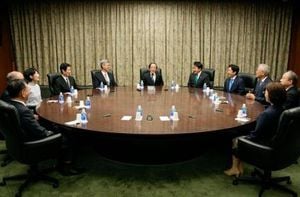On July 18, 2019, tragedy struck at the Kyoto Animation First Studio when Shinji Aoba set fire to the building, claiming the lives of 36 people and injuring 32 others. The catastrophic event not only shocked Japan but left deep scars on the animation community and the bereaved families.
Aoba was charged with multiple counts of murder and arson after he doused the studio with gasoline and ignited it. The horror of the incident reverberated throughout the nation, prompting swift legal action. During the trial, held at the Kyoto District Court, Aoba's mental state was called to question, as he claimed his motivation stemmed from feelings of being wronged by Kyoto Animation, accusing them of stealing his intellectual property.
On January 25, 2024, the court delivered its verdict, sentencing Aoba to death. The presiding judge emphasized the immeasurable pain and terror experienced by the victims during the fire, stating, "The fear and pain of the victims who met with untimely deaths is beyond measure." This harsh sentence came after careful consideration of Aoba's mental competency, which the court recognized, but determined did not mitigate the crime's severity.
Following the sentence, Aoba initially filed an appeal against the ruling. His legal team argued against the court's acceptance of Aoba's full criminal responsibility. The court had recognized Aoba's mental illness but concluded it bore little influence over his decision to commit this heinous act. This nuance came to light during the trial where Aoba was reported to have said, "I was driven to madness by the wrongs done to me by Kyoto Animation." Such statements indicated Aoba's continuing grievance against the studio, which he misattributed as the root cause of his actions.
On January 27, 2025, significant news emerged when Aoba decided to withdraw his appeal, indicating acceptance of the court's decision. This move effectively confirmed the death penalty, leaving many to ponder the psychological scars left by the tragedy not only on the victims' families but also on the broader community of Kyoto Animation.
According to Daisuke Okeda, the legal representative for Kyoto Animation, the company had been monitoring the situation closely. He remarked, "The company is aware of the withdrawal but will refrain from commenting until the situation stabilizes." The lack of immediate commentary reflects the sensitivity surrounding the matter and the collective grief shared by those affected.
The arson incident at Kyoto Animation highlights the vulnerabilities and consequences of mental health crises, especially when misdirected against innocent individuals. The story raises pressing questions about the support systems available for individuals dealing with such mental grievances, concluding with reflections on how people cope with the aftermath of such tragedies.
The trial and the effective final ruling against Aoba were not merely legal events but poignant chapters representing the struggle for justice faced by the victims’ families. The emotional toll of the tragedy continues to affect many, as they seek closure and healing from the wounds inflicted by this horrific crime. This case has left lasting impressions on Japan’s society, sparking discussions around mental health, support for victims, and the animation industry’s resurgence following such dark times.



